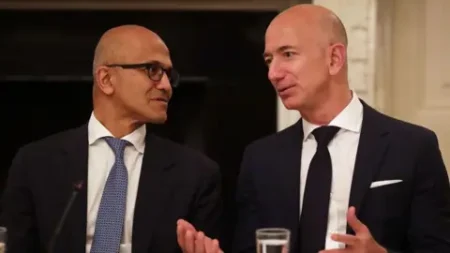In the complex realm of international business and diplomacy, a recent exchange between President Donald Trump and Apple CEO Tim Cook has drawn significant attention. The crux of the issue revolves around Apple’s strategic decision to ramp up iPhone production in India, which was met with dissatisfaction from the President. During a Thursday press conference in Qatar, Trump expressed his concerns over Cook’s plans to establish manufacturing plants in India, stating, “I had a little problem with Tim Cook yesterday. I said to him, ‘Tim, you’re my friend. I treated you very good. You’re coming in with $500 billion. But now I hear you’re building all over India. I don’t want you building in India.’”
This public confrontation underscores the tension in U.S. trade policy under Trump’s presidency, characterized by an emphasis on domestic manufacturing. Trump has implemented substantial tariffs on a wide range of imported goods with the intent of bolstering American industries and reducing trade deficits. According to his administration’s goals, these measures were designed not only to defend American jobs and stimulate local economies but also to generate revenue earmarked for planned tax cuts and economic initiatives.
Interestingly, Trump’s emerging concerns bring into focus the challenges that American companies face when attempting to balance domestic production with the global economy’s realities. Although companies like Apple claim they are aiming to increase American manufacturing to mitigate tariff impacts, the reality is that establishing factories is a time-consuming and expensive endeavor. The high costs of American labor and the complexities involved in supply chains create formidable obstacles, making it impractical for companies to rapidly shift their manufacturing bases back to the U.S.
Despite Trump’s discontent, Tim Cook has reiterated that Apple is indeed expanding its presence in the U.S. He indicated that the company is actively pursuing production growth on American soil, while concurrently enhancing its manufacturing capabilities in India. This dual-track strategy appears to be an attempt to placate both the U.S. government and the Indian market, where labor costs and production efficiency have become increasingly appealing. As Apple faces nearly $900 million in additional costs from tariffs on imports from China, the company is shifting its focus to India as part of its long-term strategy.
As confirmation of this pivot, Cook recently articulated his expectation that “the majority of iPhones sold in the US will have India as their country of origin” in an earnings call with analysts. This shift is indicative of a larger trend, wherein U.S. companies, including Apple, are diversifying their production locations to alleviate pressures from tariff policies, particularly those impacting imports from China.
For Apple, these transitions are not without their challenges. Bringing iPhone production to the United States remains a complex issue, rooted in the intricate nature of its supply chain and the associated costs. Analysts warn that U.S.-made iPhones could see drastic increases in retail prices, potentially skyrocketing to $3,500—three times the current price—if the assembly processes take place domestically. Dan Ives, the global head of technology research at Wedbush Securities, noted these significant pricing implications, emphasizing the complexities involved in reshoring manufacturing.
Despite these hurdles, Apple has remained committed to its goal of expanding its U.S. footprint. In February, the company unveiled a $500 billion investment plan aimed at creating 20,000 jobs over the subsequent four years. This initiative builds on previous efforts to diversify its supply chain amid production disruptions during the COVID-19 pandemic, which spurred Apple to enhance production capabilities, including a notable ramp-up in its Texas-based Mac Pro facilities.
In conclusion, the dialogue between President Trump and Tim Cook encapsulates the broader challenges and considerations facing multinational corporations. As political pressures mount to boost domestic production, companies like Apple must navigate the dichotomy between meeting government expectations and operating efficiently in a global market that offers alternative production options. This scenario highlights the evolving nature of international trade and corporate strategy as businesses strive to adapt to changing political landscapes and economic realities. As companies balance these pressures with their operational needs, the future of manufacturing in the U.S. remains a pivotal and contentious discussion point in the intersection of business and politics.











